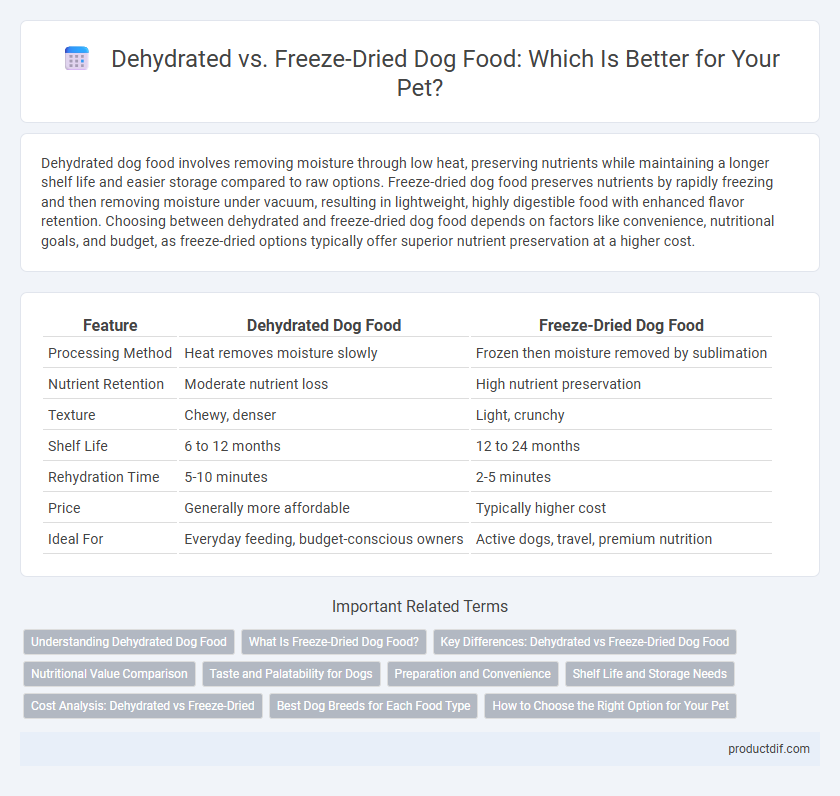Dehydrated dog food involves removing moisture through low heat, preserving nutrients while maintaining a longer shelf life and easier storage compared to raw options. Freeze-dried dog food preserves nutrients by rapidly freezing and then removing moisture under vacuum, resulting in lightweight, highly digestible food with enhanced flavor retention. Choosing between dehydrated and freeze-dried dog food depends on factors like convenience, nutritional goals, and budget, as freeze-dried options typically offer superior nutrient preservation at a higher cost.
Table of Comparison
| Feature | Dehydrated Dog Food | Freeze-Dried Dog Food |
|---|---|---|
| Processing Method | Heat removes moisture slowly | Frozen then moisture removed by sublimation |
| Nutrient Retention | Moderate nutrient loss | High nutrient preservation |
| Texture | Chewy, denser | Light, crunchy |
| Shelf Life | 6 to 12 months | 12 to 24 months |
| Rehydration Time | 5-10 minutes | 2-5 minutes |
| Price | Generally more affordable | Typically higher cost |
| Ideal For | Everyday feeding, budget-conscious owners | Active dogs, travel, premium nutrition |
Understanding Dehydrated Dog Food
Dehydrated dog food removes moisture through low heat, preserving nutrients and extending shelf life while requiring rehydration before feeding. This method retains most natural flavors and vitamins, making it a nutritious option for dogs needing a lightweight, long-lasting diet. Compared to freeze-dried food, dehydrated dog food generally has a denser texture and slightly lower nutrient retention due to heat exposure.
What Is Freeze-Dried Dog Food?
Freeze-dried dog food is a type of pet nutrition that removes moisture through a low-temperature drying process, preserving the nutrients and flavor of raw ingredients. This method helps retain enzymes and vitamins that can be diminished in traditional cooking methods, making it a highly nutritious option compared to dehydrated dog food. Freeze-dried recipes typically contain high protein content from real meat, vegetables, and fruits, promoting better digestion and overall pet health.
Key Differences: Dehydrated vs Freeze-Dried Dog Food
Dehydrated dog food removes moisture through low heat over an extended period, preserving nutrients but retaining some density and longer rehydration time. Freeze-dried dog food uses a rapid freezing process followed by low-pressure drying, maintaining more vitamins, enzymes, and a lightweight, crunchy texture with quick rehydration. Both methods extend shelf life and enhance portability, but freeze-drying typically offers superior nutrient retention and faster prep time compared to dehydration.
Nutritional Value Comparison
Dehydrated dog food retains most essential nutrients by slowly removing moisture, preserving proteins, vitamins, and minerals critical for canine health. Freeze-dried dog food preserves nutritional value more effectively by rapidly freezing and then removing moisture, maintaining optimal levels of enzymes, antioxidants, and amino acids. Both methods enhance shelf life, but freeze-dried options generally offer superior nutrient retention and bioavailability, supporting better digestion and immune function in dogs.
Taste and Palatability for Dogs
Dehydrated dog food retains more natural flavors through gentle moisture removal, resulting in a rich, meaty taste that is highly appealing to dogs. Freeze-dried dog food locks in nutrients and aroma by rapidly removing moisture at low temperatures, preserving a fresh flavor profile that enhances palatability. Both methods improve taste compared to traditional kibble, but dogs may show a preference for the intensified flavor and softer texture of freeze-dried options.
Preparation and Convenience
Dehydrated dog food requires rehydration with warm water before serving, which can take several minutes but allows for easy storage and longer shelf life. Freeze-dried dog food rehydrates quickly with cold or warm water in just a few minutes, offering convenience for pet owners seeking fast meal preparation. Both options eliminate the need for cooking, making them practical choices for busy households looking to provide nutritious meals.
Shelf Life and Storage Needs
Dehydrated dog food generally has a longer shelf life, often lasting up to 12 to 18 months when stored in a cool, dry place, due to the reduced moisture content that inhibits bacterial growth. Freeze-dried dog food typically retains more nutrients and can last up to 25 years if vacuum-sealed and stored properly, thanks to its ultra-low moisture levels and minimal processing. Both require airtight containers and protection from humidity, but freeze-dried options demand more precise temperature control to maintain quality over extended periods.
Cost Analysis: Dehydrated vs Freeze-Dried
Dehydrated dog food generally costs less than freeze-dried options due to its simpler processing and lower energy requirements. Freeze-dried dog food commands a higher price because the preservation method retains more nutrients and flavor, justifying the premium. Pet owners should weigh upfront costs against long-term value, considering factors like shelf life, nutrient retention, and feeding frequency.
Best Dog Breeds for Each Food Type
Dehydrated dog food suits low-activity breeds like Bulldogs and Basset Hounds due to its easier digestibility and moisture retention, supporting joint health. Freeze-dried dog food is ideal for high-energy breeds such as Border Collies and Australian Shepherds, providing nutrient-dense, lightweight meals that maintain maximum vitamins and enzymes. Both food types offer tailored nutrition that aligns with the metabolic needs and activity levels of specific dog breeds.
How to Choose the Right Option for Your Pet
Choosing between dehydrated and freeze-dried dog food depends on your pet's specific nutritional needs and lifestyle. Dehydrated dog food retains more moisture, offering easier digestion and hydration, while freeze-dried options preserve more nutrients and are lightweight, ideal for travel. Consider factors like your dog's age, activity level, and any dietary restrictions to select the best option for optimal health and convenience.
Dehydrated dog food vs freeze-dried dog food Infographic

 productdif.com
productdif.com